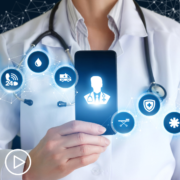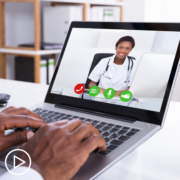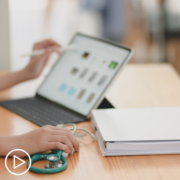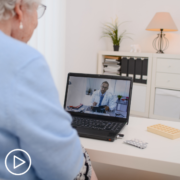Tag Archive for: Dr. John Pagel
Will Telemedicine Improve My Quality of Life with CLL?
Will Telemedicine Improve My Quality of Life with CLL? from Patient Empowerment Network on Vimeo.
How do chronic lymphocytic leukemia (CLL) patients and care partners feel about the impact of telemedicine on quality of life? Watch as a CLL patient and care partner, Bob and Susan, discuss how easier access to blood test results affects patient emotions before and during remote office visits.
See More From the CLL TelemEDucation Empowerment Resource Center
Related Resources:

Will Telemedicine Be a Long-Term Survivorship Tool for CLL Patients? |

Is Remote Monitoring for CLL Patients on CAR T Therapy the Future? |

|
Transcript:
Susan Bottega:
The role of telemed in terms of survivorship I think is a very, very interesting subject. CLL patients are living a very long life these days with the onset of the novel agents that are coming out. Quality of life becomes a very, very important subject for CLL patients. So much of their quality of life is diminished by the visits that they have to make into doctors’ offices.
The anguish that they spend the day before, the sleepless night that accompanies the doctor’s visit. I think that this is extremely important. You’re looking very possibly of at least two days taken out of your life, and if you’re making these visits on a monthly basis or bi-monthly basis or even tri-monthly basis, that’s a long period of time to take out of the span of your lifetime. And as we’re living longer, this becomes more and more important.
You want to have that quality of life, you want to be able to go on vacations. Your vacations can’t be postponed because you have a doctor’s appointment looming in the future. You can take your computer right along on vacation with you and share your vacation with your doctor.
Bob Bottega:
I like that.
Susan Bottega:
I think the anguish that you feel about blood tests is diminished by it. You don’t have to wait to get the results of your blood tests, your blood tests pop right up on your patient portal. You don’t have to sit there and wait in a doctor’s office until you see those results.
Once you see your doctor, you’ve already got your results and you’re calm about it, you’re relaxed because you know what the results are and you can discuss them without having to deal with the anxiety that comes with hearing, “Okay, my white blood cell count has gone up considerably, so how do I calm myself down to discuss this intelligently at this point in time when I’m emotionally so upset over it?” I think these are very, very important things about the quality of your life. How about you, Bob?
Bob Bottega:
I think you said it all.
Susan Bottega:
Don’t I always? (laughter)
Dr. John Pagel’s Top Tips for Preparing for Your CLL Telemedicine Visit
Dr. John Pagel’s Top Tips for Preparing for Your CLL Telemedicine Visit from Patient Empowerment Network on Vimeo.
For chronic lymphocytic leukemia (CLL) patients, telemedicine has emerged as an option that requires new ways of working with their health team. Watch as CLL expert Dr. John Pagel shares his advice to patients and caregivers for getting the most out of telemedicine visits.
See More From the CLL TelemEDucation Empowerment Resource Center
Related Resources:

Will Telemedicine Be a Long-Term Survivorship Tool for CLL Patients? |

Is Remote Monitoring for CLL Patients on CAR T Therapy the Future? |

|
Transcript:
Stephanie Chuang:
You had mentioned, patients need to be prepared when they come to their telemedicine visits, doctors have limited time, of course. So what are your top three tips or so for patients and their caregivers who are preparing for their telemedicine visit?
Dr. John Pagel:
So here’s a good important thing to say around that. Number one, you know, what happens is you’ll get told you have a telemedicine visit at 10:00 AM on Tuesday. And so you’re looking forward to 10:00 AM on Tuesday. And 10:00 AM comes around, and you’re waiting by the phone, and it doesn’t ring immediately, or the Zoom doesn’t come up immediately, please understand you have to be a little bit flexible with your physician. Just because it says that time…it’s the same thing kind of like in the clinic, it all kind of flows and works together. And so please be flexible and be patient. Not accepting excessive delays, that’s not really cool, we get that, but it’s often very hard to be right on the dot at 10:00 AM. So number one, be flexible. Number two, have your questions written out or focused about what you want to learn and understand that visit. It may not be a lot different than the last visit, that’s okay. But if you don’t have those, often, what will happen is that when the visit’s over the phone is hang up or the Zoom call is put away, you’ll remember, “Oh, I forgot to ask X, Y, or Z.” don’t let that happen.
And the way you don’t let that happen is to be focused there with what you want to learn. And then lastly, if it’s possible, don’t be excessive. Meaning that, focus on the things that are important, meaningful, relevant to what’s happening to your health, your disease in your interaction with your physician. There are things that we all can list that could be very, very long in the list, but many of them aren’t going to be something that the physician can get to in a very meaningful, important way. Ask though, if you can’t get to those things that are important, that you try and follow up with them very quickly, perhaps in another visit relatively soon. But keep your expectations, if you could, to a very realistic approach, directed and focused on taking care of you and managing your CLL.
Will Telemedicine Be a Long-Term Survivorship Tool for CLL Patients?
Will Telemedicine Be a Long-Term Survivorship Tool for CLL Patients? from Patient Empowerment Network on Vimeo.
With telemedicine as a part of the chronic lymphocytic leukemia (CLL) toolkit, what will its role be in the future? Watch as CLL expert Dr. John Pagel shares his viewpoint of how telemedicine will play into long-term survivorship care for patients.
See More From the CLL TelemEDucation Empowerment Resource Center
Related Resources:

|

Is Remote Monitoring for CLL Patients on CAR T Therapy the Future? |

|
Transcript:
Stephanie Chuang:
We really haven’t scratched the surface, it seems, when it comes to using telemedicine as a long-term survivorship tool. So for the sub-group of CLL patients who never need treatment, does telemedicine still bring any major advantages?
Dr. John Pagel:
There are people, and it’s not uncommon, who actually never even get treated. I’ve had people in my clinic who have had CLL diagnosed and never treated for over 20 years or more. It does happen. And those people often can be managed with their primary care physician, even though it’s good to have a CLL focused clinician, an oncologist or even expert in their back pocket, but they may only need to have that televisit with that expert or oncologist once a year. So those are the ideal kind of patients who it’s not great to drag them in if there’s nothing going on with them, but they still need to be evaluated and have a discussion about what’s happening, at a minimum once a year in many cases.
What CLL Symptoms Can Be Monitored via Telemedicine?
What CLL Symptoms Can Be Monitored via Telemedicine? from Patient Empowerment Network on Vimeo.
For chronic lymphocytic leukemia (CLL) patients, some symptoms can be monitored via telemedicine, while other symptoms are best to check in-person. Watch as CLL expert Dr. John Pagel discusses getting optimal care by CLL symptom type.
See More From the CLL TelemEDucation Empowerment Resource Center
Related Resources:

|

Is Remote Monitoring for CLL Patients on CAR T Therapy the Future? |

|
Transcript:
Stephanie Chuang:
There are CLL patients on specific treatment protocols and those who need follow-up for potential adverse effects of treatment compliance and, of course, progress. And so the question is, how effective of a tool is telemedicine for this group?
Dr. John Pagel:
I’ve been very impressed that we can meet the needs of patients, we can meet the needs for clinical trials. Clinical trials have really adopted and been flexible with the idea of being able to do telemedicine in a large degree because of COVID in CLL. And I would say clearly that a conversation and close discussion with the physician’s critically important, it comes back to what we mentioned specifically, it’s about education. Patients need to understand that if they’re not feeling well, meaning, they’re having drenching night sweats or they’re losing weight or they’re having pain, those aren’t things to sit back and just wait for your telemedicine visit, they need to contact the physician and to be able to be seen urgently or quickly if needed.
Telemedicine is going to be a bridge to make that happen, but in general, those are people that are in a bit of a different class of what we’re discussing here today. So monitoring disease, taking care of people with regard to assessments of their blood counts can be done all again through telemedicine, but more acute problems, those patients do, of course, need to be seen.
Will Telemedicine Give More CLL Patients Access to Clinical Trials?
Will Telemedicine Give More CLL Patients Access to Clinical Trials? from Patient Empowerment Network on Vimeo.
Though some with chronic lymphocytic leukemia (CLL) may have limited access to clinical trials at expert centers, telemedicine may change access for some patients. Watch as Dr. John Pagel shares how telemedicine might improve CLL clinical trial options.
See More From the CLL TelemEDucation Empowerment Resource Center
Related Resources:
Will Telemedicine Activate More Remote Tools to Manage CLL?

|

|

|
Transcript:
Stephanie Chuang:
There is a lot of attention being paid to clinical trials and progress, and so how might telemedicine impact clinical trials when it comes to CLL therapy?
Dr. John Pagel:
Well, I want to first tell the audience that clinical trials are critically important for many patients who have CLL. Clinical trials are really an opportunity to get something that’s better than the standard of care most often, or at least just as good and has the promise again, to be better. We have advanced major new paradigm changing therapies over the last many years through clinical trials, and now we’re looking at really exciting things like bispecific antibodies, newer generations of these targeted therapies that are better tolerated and perhaps even more active in resistant patients. And even as we talked about CAR T-cell therapies, those are all only available through clinical trials, and then that’ll continue to evolve and go on as well.
I would encourage patients to think about clinical trials, and because of telemedicine, now we’re going to be able to reach to other patients who are further away from an expert, perhaps where clinical trials are only available, and they can be then involved in one of those opportunities. Telemedicine, I hope, and I believe, will be a major advance for getting the cutting-edge, best therapies for patients who might be very far away from a very important expert center.
Will Telemedicine Activate More Remote Tools to Manage CLL?
Will Telemedicine Activate More Remote Tools to Manage CLL? from Patient Empowerment Network on Vimeo.
As telemedicine has grown in the management of chronic lymphocytic leukemia (CLL) care, will its use bring other remote tools into patient care? Watch as CLL expert Dr. John Pagel explains.
See More From the CLL TelemEDucation Empowerment Resource Center
Related Resources:

|

|

|
Transcript:
Stephanie Chuang:
Dr. Pagel, there are tools out there like video otoscopes, electronic stethoscopes, thermoscopes, retinal imaging systems, will CLL patients be able to have access to those tools for themselves one day, and on that note, what are the tools you believe will impact the future of CLL care?
Dr. John Pagel:
Yeah, in fact, that’s really where we’re going. We do stuff like that already through the hospital. As you may know, as an example, if someone comes in with a cardiac condition, they need to be monitored remotely, they can’t stay in the hospital indefinitely we need to kind of know what’s happening, perhaps as an example with their heart rhythm. So they actually have tools where they can wear a little monitor even on their wrist that communicates with the doctor. So the doctor can see even in real time what’s happening with that individual patient.
These types of tools are the future, and we’re not going away from them, we’re embracing them. We’re not there yet for routine standard care, especially in CLL but they will be simple things like heart rate, blood pressure measurements that are very simple and easy to do that not only are able to be read by the patient, but actually again, from a remote standpoint, be electronically downloaded and delivered to the physician, real time. That’s going to be important. And actually, I believe that we’ll even add advances for that in the blood work or other approaches in the near future. So just stay tuned we’re just scratching the surface there.
Stephanie:
Okay, so you’ve heard it here first from Dr. Pagel, stay tuned on this.
Telemedicine Challenges and Opportunities for CLL Patients
Telemedicine Challenges and Opportunities for CLL Patients from Patient Empowerment Network on Vimeo.
For chronic lymphocytic leukemia patients, some challenges have emerged with care via telemedicine. In this telemEDucation program, CLL expert Dr. John Pagel explains opportunities for patients and providers to optimize these visits.
See More From the CLL TelemEDucation Empowerment Resource Center
Related Resources:

|

|

|
Transcript:
Stephanie:
Let’s highlight both the challenges and opportunities that come with telemedicine. So first, it does seem to be reshaping the traditional CLL doctor-patient relationship to some extent, and you’ve touched on this. So with your experience as a CLL expert, what are the limitations of telemedicine?
Dr. John Pagel:
Well, one of the, of course, things about telemedicine is it’s not just figuring out how to do it from the provider’s standpoint, but it’s also figuring out how to do it from the patient’s standpoint. So we can’t expect, to be honest, that this goes just like it would if you were in the clinic, sitting on the exam table with your physician there at the computer right next to you in that exam room, it shouldn’t be expected that it’s going to go like that. And unfortunately, to this point, we’re trying to figure out that. It doesn’t do that. And so that takes some alteration in our approach, on the provider’s side and on the patient’s side as well – and in particular, what the expectations are for these patients and for the providers.
So it needs to be very focused, and it needs to be concise. So what is my message there? For the patient’s side, know that the doctor’s busy, they’re doing their work all day long with lots of sick people potentially, and so they need to be very focused on what the issues are and the direction of the conversation. So come prepared to a telemedicine visit, if you’re a patient. Come prepared to know what you want to talk about and what the focus is with the priorities that you might have that are issues for you around your CLL disease. And the provider will do that hopefully as well. It’s a learning thing. But I will tell you, the first time will take a little bit of learning. By the second, third time that you’re actually interacting with your doctor, that same one-on-one relationship, it really
Will Telemedicine Mitigate Financial Toxicity for CLL Patients?
Will Telemedicine Mitigate Financial Toxicity for CLL Patients? from Patient Empowerment Network on Vimeo.
The cost of chronic lymphocytic leukemia (CLL) care can be inappropriately high for some patients. Watch as CLL expert Dr. John Pagel details how telemedicine can affect the high cost of care.
See More From the CLL TelemEDucation Empowerment Resource Center
Related Resources:

|

|

|
Transcript:
Stephanie:
Dr. Pagel, we know the stresses of paying for cancer treatment. So how can maybe telemedicine help to mitigate financial toxicity for these countless CLL patients and their families?
Dr. John Pagel:
Well, this is an important part of medicine in general, and it’s certainly relevant, of course to the CLL patients. The cost of care is inappropriately high, not just the pharmaceutical agents, but, of course, the visits. So there are evolving ways of figuring out how reimbursement will happen for physicians and how payments happen on the side of patients. We’re still not completely clear on that, but likely what will happen, over time, is that we will be doing less and less unnecessary tests. And with less unnecessary tests, the cost of care will go down for the individual specific community and patients. It’ll be very important for us to figure out what we really need to be doing and what we don’t, and telemedicine’s going to help us figure that out.
Is Remote Monitoring for CLL Patients on CAR T Therapy the Future?
Is Remote Monitoring for CLL Patients on CAR T Therapy the Future? from Patient Empowerment Network on Vimeo.
Will telemedicine play a greater role in CAR T remote monitoring and help some CLL patients avoid long hospital stays? Learn how harnessing technology could optimize care for CAR T patients.
See More From the CLL TelemEDucation Empowerment Resource Center
Related Resources:

|

|

|
Transcript:
Stephanie:
There’s excitement around telemedicine and CAR T, so specifically remotely monitoring CAR T to help avoid patients having to deal with long hospital stays. Is this the future?
Dr. John Pagel:
It’s clearly the future. So what you’re alluding to, of course, is a way that we are now doing to trick a patient’s own immune system cells into targeting and fighting the cancer, and of course, we’re talking about CLL here. It’s a revolutionary treatment in CLL, we still have quite a ways to go, we are doing a lot of important trials and advancing the field, but we don’t have an approved approach in CLL yet, but we will. No doubt. And the goal of that therapy is not just to eradicate the disease and keep it from coming back, but it’s also to do it in a very safe and actually appropriate way, and that’s as an outpatient.
Those patients clearly have risk for an adverse event or a side effect, that can be problematic. So they have to be in close contact with a physician and sometimes they’re required to be very close to the treating center for prolonged periods of time. Most of the time that’s very uneventful. So it’s a major disruption to a patient’s life. You could imagine that you’re traveling hundreds of miles to go to a center, and not just go to a center that provides the CAR T-cell therapy, but is actually monitoring you for a month or more, so you’re away from home for a long time, living in a hotel, that’s a problem.
Telemedicine is a way to get around that. We will evolve to being able to treat patients, get them home, and then telemedicine will work where the visits can be done in a very expeditious manner, and again, in a very appropriate way so that that will also reduce the interactions away from home, and as we said cost of care as well.
What Subset of CLL Patients Should Utilize Telemedicine?
What Subset of CLL Patients Should Utilize Telemedicine? from Patient Empowerment Network on Vimeo.
With monitoring of chronic lymphocytic leukemia (CLL), there is a subset of patients that will get the most benefit from telemedicine visits. Learn more about which CLL patients should use telemedicine and which higher risk patients should still visit in-person.
See More From the CLL TelemEDucation Empowerment Resource Center
Related Resources:

|

|

|
Transcript:
Stephanie Chuang:
Can you share the telemedicine platforms that you, in your practice, use and maybe so far, what are some of the best practices observed?
Dr. John Pagel:
Right, and I think that’s probably the biggest key and takeaway that we can talk about here for the audience, is to remember that telemedicine isn’t going to be appropriate for every patient. And for each individual patient, there are times where it certainly would be very appropriate and other times where it might not be. So, you know, of course, people that have active, growing, rapidly progressing disease, we’re not talking about those people, those people need to be seen by their provider, they need, of course, close attention and monitoring. But many, many patients, in fact, the majority of patients with CLL are not in that kind of group.
So we’re talking about people that don’t have high-risk genetic features, in particular, those are things like a deletion of the short arm of chromosome 17, that’s a 17p deletion, or an 11q deletion or a TP53 aberration, those are genetic risks that your doctor will know about with regard to your specific individual CLL. And most people, fortunately don’t have those features and they behave in a very indolent, slow growing, more benign-like fashion, and then those are the people where probably telemedicine would be appropriate for many visits.
I’ll just say, I would suggest that in general, telemedicine shouldn’t be something that you do with every single visit. Every once in a while, you should have that face-to-face, hands-on interaction with your primary provider. But I’ll also remind people that not everyone lives real close to their oncologist or even their CLL expert. So if you’re far away, you can connect not just with your oncologist who takes care of you, but with an expert who might be some distance away, and that’s the beauty I hear about the telemedicine.
Will Telemedicine Be Part of Routine Management for CLL?
Will Telemedicine Be Part of Routine Management for CLL? from Patient Empowerment Network on Vimeo.
With the COVID-19 health crisis, telemedicine has emerged as part of routine healthcare. Watch as CLL expert Dr. John Pagel gives his viewpoint on how telemedicine will be included in routine management of CLL.
See More From the CLL TelemEDucation Empowerment Resource Center
Related Resources:

|

|

|
Transcript:
Stephanie:
You know, of course, COVID-19 has forced healthcare providers to use telemedicine more than ever before, so do you think this will definitely continue on past COVID-19? And if so, how quickly it will even grow?
Dr. John Pagel:
Well, I think the federal government’s understanding that this is a part of medicine moving forward that’s important for patients, patients like it, and I don’t blame them. If I’m on that side of care, I feel perfectly fine, I have CLL, let’s say, and nothing’s going on with me, and I’m very well-educated about my disease, and by the way, that’s probably critically important to this whole conversation is to understand and be educated well about your specific disease.
Remember, each patient has to be their own best advocate. And that makes telemedicine work. And frankly, the horse is out of the barn, in my opinion, telemedicine is where we’re going, and it’s not going to come back. Patients like it, physicians are getting used to it, Stephanie, it’s something that we are reluctantly in some ways adopting, but it’s just how it is, and I think it’s going to be a major important thing for many, many CLL patients as routine management.
How Will Telemedicine Impact Time-Limited Therapy in CLL?
How Will Telemedicine Impact Time-Limited Therapy in CLL? from Patient Empowerment Network on Vimeo.
With chronic lymphocytic leukemia time-limited therapy, treatment is delivered for a pre-determined period of time and then is stopped after remission is achieved. Learn how telemedicine impacts patients on this type of treatment.
See More From the CLL TelemEDucation Empowerment Resource Center
Related Resources:

|

|

|
Transcript:
Stephanie:
Dr. Pagel, we’d love to ask about the time-limited therapy in CLL specifically, and how telemedicine might play a role in that?
Dr. John Pagel:
Well, this is one of the things that we’re still learning about, Stephanie, and I think it’s going to evolve and change a bit over time, but we know that we need to do. Continually better for patients, of course, we need to meet unmet needs in CLL. And there are lots of unmet needs still in CLL, of course, one of them is curing the disease, and we’re not focusing on therapeutics today in our discussion about working towards that goal, but that does remain a major goal, and we’re working towards that. But really, of course, there are situations with unmet needs where people have been getting therapy continuously now for long, indefinite periods of time, and they may not need all that therapy. And so one of the things is that we’re learning about is what you mentioned time-limited therapy. So the idea of delivering therapy for some defined period of time, getting to a very good remission and then stopping therapy. And where telemedicine comes into play there, is that if they’re off of therapy and doing well, we don’t need to necessarily drag those patients back to the clinic and put them through, not only all of that exposure and that risk, but of course the anxiety that goes with it and everything else.
So again, I think that in those cases where we’re monitoring patients with telemedicine, it’s beautiful for time-limited therapy, and it also allows for us to stay even in closer contact with our patients who again, might have some difficulty getting into the clinic.



